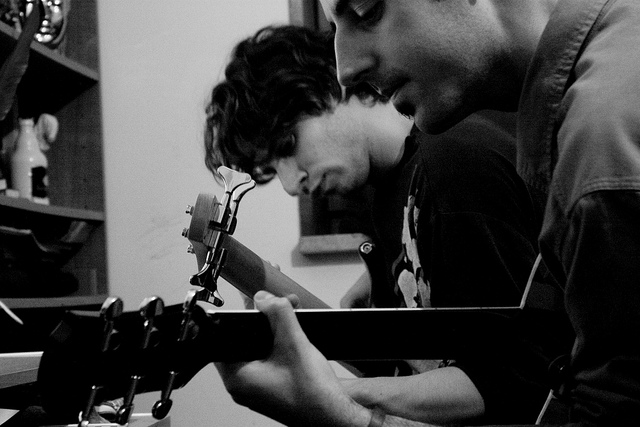
If you’ve ever asked the question, “How do I make money from music?” this is for you.
Tens of millions of musicians want to make money from their music. Only one percent ever do. Why?
Ask most musicians how they plan to make money and they all say the same thing: I’m waiting for my music to be discovered. I’m waiting for a good manager, a good booking agent, a good label. I’m waiting for my moment, my big break.
Musicians would not be this passive if making money was the primary reason they made music. Almost all musicians would like to make money from their music, but it’s not why we make it. We make music because we have to. We have to express ourselves. We have to communicate something and connect with people. As Henry Rollins once said, “I’d rather be heard than paid.”
But we can get paid. In fact, we have more opportunities today than ever. But waiting for opportunities to come remains a losing strategy. Opportunities are made — our moment will only come if we create it, and only then if we’ve developed our skills to rise to the occasion.
There is a simple formula to making money in music and many other creative endeavors. The greater your skills, the greater your opportunities. Conversely, more opportunities allow you to further develop your skills. Amplifying this feedback loop is the way to succeed.
So what skills does the musician need to tap into the music economy? They boil down to four broad categories, and it’s no longer enough to be competent in one or two. There are simply too many musicians in the world trying to make money from their music. It used to be you could be a master of one of these skills and that might be enough to get you “discovered” and exploited. Today, we must be competent in all four skills, and masters of at least one or two to truly have a shot at making our own breaks and earning significant revenue from music.
Composition
There are more musicians creating more music than ever before in history, and most of history’s recorded music is accessible to anyone with a computer. The bar has never been higher for novelty and originality — it’s the old chestnut of “it’s all been done before.” As we learn more about composition, we realize the challenge is to create an original expression from musical building blocks that seem to have already been combined in every imaginable configuration. And yet out of these seemingly infinite combinations, we put our own spin on the patterns of popular chord progressions, lyrical motifs and song structure that emerge. We create by taking our influences and making something new of them.
Composition is truly an art in and of itself, and too many musicians simply brush it off to focus on performing and recording. Many musicians fail to make money from their music because they are not songwriters. They channel their influences so directly, nothing original emerges. They sell the song short.
The old adage “writers write” applies to composition as well. One must first write songs to write good songs. What album would you rather listen to: the first ten songs a musician wrote, or the best ten songs chosen from the first 15 songs the musician wrote? By the time you are writing great songs, you will have written many.
Composition not just “where the money is” from a copyright perspective, composition is the art of music that gives rise to the other skills: performance, recording and entrepreneurship. You are getting paid for your labor to create something completely intangible, so the profit margin can be enormous. But it’s also highly competitive with a significant “right place at the right time” component. To cut through the noise of more musicians writing songs than ever before, your song needs to be performed, recorded and “shopped” at a professional level.

Performance
Performance is the Holy Grail of revenue for musicians. It’s always been where the highest profits have been for the musician themselves. This has only become more true in the Digital Age as selling access to recordings has dried up as a primary revenue stream. Post-scarcity music distribution shows that sharing songs is not stealing, and the only thing a musician loses when their song is copied is a single opportunity to charge the listener a fee that most would not pay. In turn, they gain an opportunity to make a fan, which is far more valuable in the long run. In order for this equation to work optimally, the composition has to be great, and performance has to be a part of your plan, because it’s where fans show their most value.
Touring and T-shirts are nothing to scoff at — even though gas is more expensive and ticket prices have not increased by much, the profit margin is usually greater than sales of any recording. When a fan is at your show they are the most charged up on your music than at any previous moment. They want to leave with a T-shirt and talk about how awesome the show was, marketing your band and paying for the opportunity. It takes great performances to put them in that state.
The same advice for composition applies to performance: perform, perform, perform. Book any gig you can find. Performing is a process of “paying your dues”. There will be awful shows and huge mistakes, but eventually so much of performing will come naturally to you.
To the extent that performance is a challenging skill to learn, working on your show is a fun challenge (unless you have stage freight). What’s more of a challenge are the logistics of putting on a live show that looks and sounds great, not to mention the huge sacrifices that must be made to tour. As the age bracket gets older and older, there are fewer and fewer musicians who find touring manageable. Locked in a traveling vehicle killing time for most of the day, away from family and friends, is not how most people want to spend 200 days of the year. Touring makes it hard to have a normal life, normal relationships, a normal home and job. But performing musicians are not normal, and it’s a big part of why people are so attracted to them. There are plenty of us who feel that hour on stage makes all the sacrifice worth it. And with a properly managed tour, a we can come home with some money in our pockets, having made fans we can count on to support us not just when we come to town, but also in between releases and show dates.
The internet has enabled musicians to book their own shows and tours, but many have not mastered performance. It’s an art in and of itself, a combination of equipment, stage presence, focus, charisma, mystique, emotion, crowd interaction, and a host of other factors. They’re difficult skills to teach, but come naturally as you play more and more shows. To maximize your opportunity to create value from your music, performance is critical to the overall strategy.
Recording
By now you probably see the pattern: the internet affords you incredible new opportunities, but they can’t be taken advantage of unless your skills are well-developed. Recording is no different in this sense, but it is very different from composition and performance in how one develops the skills.
That’s because unlike composition and performance, which are accessible to anyone with an instrument and an imagination, not everyone can record whenever they feel like it. To be sure, home recording technology has completely transformed the way musicians record, and more than ever have the ability to record themselves. But it’s a small minority of musicians who can produce, engineer, mix and master their own recording at a level of quality consistent with professional releases. It is getting easier as the tools get better and listeners being appreciating a wider spectrum of audio fidelity.
Today, every musician should have some way to record at least demo-quality recordings at home. A big part of learning the skill of recording is learning how to perform under the magnifying lens of the studio. There is also the task of “getting a sound” in the studio, a process often wholly unique from its analogue in developing the sound of one’s live show. And there’s no better way to get what you want from the studio you’re paying than to play them a rough idea of the sound in your head.
Every musician should have some way to demo songs in order to work out as much of the recording in advance as possible. Even when done at home, recording a song or album is a big production. It only happens once, in the sense that the recording you make is the recording you’re stuck with until the end of time.”
Ultimately, most musicians will find themselves paying a professional to create a professional-level recording. Your closest fans may accept less, but it’s hard to build a substantial audience around music that is recorded poorly. Fans want to listen to your music all the time, the better the recording, the more attractive it is to listen to over and over again. A chance to be heard is a chance to be paid, and you increase your chances with a great recording.
Entrepreneurship
Most musicians intuitively know they need to write and perform great songs, and record a great version of them to win fans. Entrepreneurship is the art and science of building a business around those fans, and the compositions, performances and recordings they want.
It used to be musicians waited to be discovered and signed by a label. The label would provide the business services to run their careers. Nine out of ten failed, and those who succeeded were often ruthlessly exploited, but it was the only game in town until the internet disrupted it all.
Independent labels can still make good partners for bands that grow their businesses beyond several thousand fans, but increasingly musicians are making their own income directly from fans. Though the Digital Age has made this possible and even easier, but it is still not exactly easy.
Entrepreneurship requires waking up every morning ready to tackle the tasks that lead to accomplishing your goal of making money from your music. It requires understanding and development of the skills needed to accomplish your tasks. You must set specific goals that lead to making money.
In the pursuit of making music, composition, performance and recording come naturally. In the pursuit of making money, entrepreneurship must be learned. You will draw on your natural abilities to be social and network with people, and develop those relationship-building skills if you lack them. You will become a master at exchanging value, the fundamental concept that underlies all business. Marketing and PR follow from the skills acquired in building these connections, and are critical for getting people exposed to your compositions, performances and recordings.
This ultimately leads to building enough fans to finance your business, either directly through crowdfunding or by attracting a working partner who believes in your business, such as a manager, booking agent, producer or promoter. Do it yourself does not mean do it alone, and entrepreneurship is all about making the personal connections that will sustain your music as a business.
(Note: If you’re into learning these skills, you might like the Band as Business course I co-produced.)

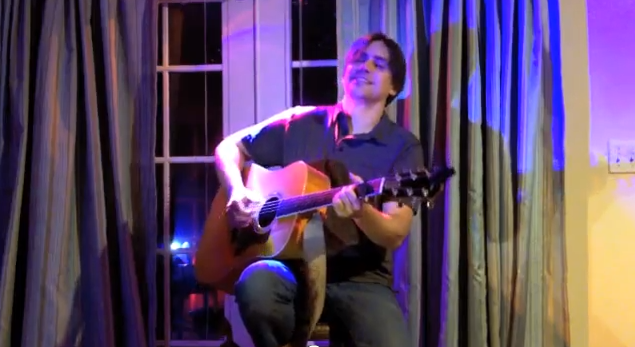
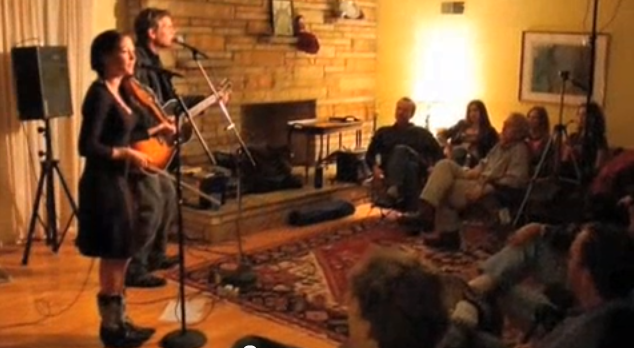

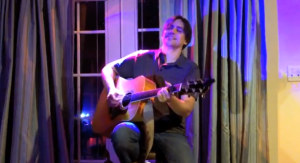
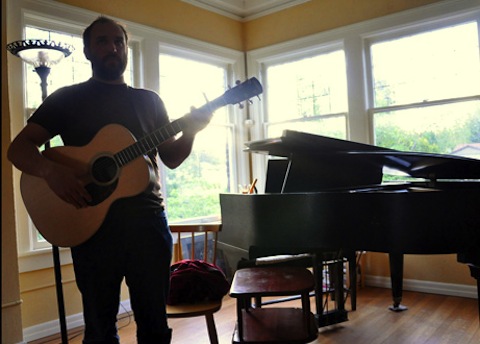
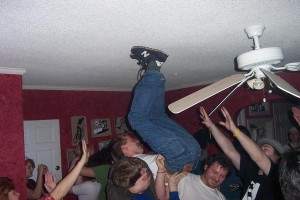 Most of today’s unsigned, independent bands that have toured the country with no booking agent and no management have played their share of living rooms. I know I have. But these living rooms are not often the kind of urbane, sitting-down affairs you see Bazan playing for 30-somethings. Rather, the hybrid living room/venue is rooted in “punk houses” where a bunch of high school and college-age music fans get together to hang out, party and host local and touring bands. I can honestly say from personal experience these house shows are some of the most fun and inspiring shows I’ve ever played. Our fans have crowdsurfed into ceiling fans more than once (pictured here). But the reason these shows are so memorable has just as much to do with the performance as it does with the camaraderie of being able to meet and entertain people in their homes.
Most of today’s unsigned, independent bands that have toured the country with no booking agent and no management have played their share of living rooms. I know I have. But these living rooms are not often the kind of urbane, sitting-down affairs you see Bazan playing for 30-somethings. Rather, the hybrid living room/venue is rooted in “punk houses” where a bunch of high school and college-age music fans get together to hang out, party and host local and touring bands. I can honestly say from personal experience these house shows are some of the most fun and inspiring shows I’ve ever played. Our fans have crowdsurfed into ceiling fans more than once (pictured here). But the reason these shows are so memorable has just as much to do with the performance as it does with the camaraderie of being able to meet and entertain people in their homes.